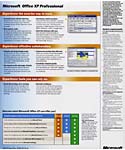May 13, 2006Microsoft Bungling Bundling?Danny Sullivan recently wrote about the failure of my former employer to bundle websearch: I am nauseatingly exhausted by idea that Microsoft will conjure up some magical method of yanking people into its MSN Windows Live Whatever You Want To Call It search service via the Windows operating system or the Internet Explorer browser. Microsoft has failed for years to be successful in this, which is why it's amazing anyone would still believe it. But Danny is wrong. Microsoft has not "failed for years" at bundling search - it not has even taken a swing at bundling search yet.... Please note that, as always, the thoughts here are mine; I do not speak for my employer or anybody else. Microsoft Never Bungles Bundles Bundling, executed well, is an effective market-expansion strategy, and Microsoft has never failed at it before. So why hasn't Microsoft bundled its way to search market share? Has bundling suddenly become ineffective? My former project, Internet Explorer, is the best-remembered example of successful bundling, leaping from negligible market share to over 90% in just over two years. It did this thanks to not one, but several bundling strategies all pursued in parallel: IE was bundled with Windows, Office, Macintosh, ISP installs, AOL, MSDN, TurboTax, etc, and so on. Don't get me wrong, I am very proud of the work we did developing IE, and I believe we built a terrific product. But I hold no illusions: the key to Microsoft's success in the browser space was not genius coding. The key was a series of strategic packaging decisions and business deals. Has Microsoft been Tamed? It is common in the press to assert that Microsoft has somehow been tamed by the DOJ. That today's Microsoft "is a different company" than the one that was found to be illegally bundling IE. If that is true, I don't see it. Perhaps Microsoft has been hobbled by a loss of talent. But if Microsoft seems to be moving slower these days, it is not because its monopoly-power aggressiveness has been reigned in. Microsoft continues to loudly proclaim and practice its mastery of bundling. For example, it is still notoriously difficult to remove Messenger from Windows XP - result? - worldwide leading market share in a highly contested field. And have you ever wondered, what is so uniquely wonderful about Microsoft Active Directory? Or Exchange servers? Or Windows Media Player? Perhaps Microsoftees who read this space can suggest an example where Microsoft has failed to gain share through strategic bundling. Or maybe they can point to an example where, post-DOJ, bundling is no longer done in an area that is a strategic priority. I have tried to think of an example - any example would be interesting - but I cannot think of one. I used to think that Xbox was uniquely unbundled until Bill announced at this year's E3 that Microsoft would now be pushing for Live Anywhere console-PC integrated gaming. Microsoft is out to prove that even a gaming console service can be bundled with a PC OS. Can the Internet be Bundled?
Despite expressing an interest in websearch, Microsoft seems to have been unable to capture leadership in that space. Maybe bundling no longer works? Maybe search is different and cannot be effectively bundled with a PC operating system? Or maybe Google is too much better? Or maybe Internet services in general cannot be effectively bundled with an OS? It is hard to really know, because nobody has given it a serious try yet. Apple is out there with the moderately interesting dot-mac. And their iTunes does pretty well, which is sort of bundling-with-the-iPod. But that's pretty much it. Apple doesn't do websearch. They do not have a dominant PC OS. And Microsoft hasn't tried bundling search yet. Some say, "But IE 6 already has a search button and I never use it!" So why hasn't Microsoft succeded in turning this oh-so-clever-bundle into search traffic? Any Microsoft program manager will be able to tell you the answer: one button does not a bundle make. Why Search is Not Yet Bundled When Microsoft shipped Windows XP in 2001, there was no business model for search. At that time, Web Search was a curiously useful technology that could be licensed from those funny information-retrieval companies like Excite and LookSmart and Google. And as useful as websearch might be, it appeared to most people that these technology-oriented Internet Boom companies did not have a good way of making money. As a business, Web Search did not seem as interesting as Internet Auctions or Internet Malls; it did not seem nearly as interesting as Interactive Television. So the Search button in IE was not designed as a strategic bundle. The button was put in by the developers to satisfy that ever-present little need to find things quickly on the web. In other words, the current Search button in IE was designed to address a user need. But strategic bundling is not about satisfying user needs. Strategic bundling is very different. Bundling Office-Style
When bundling Office, Microsoft bound the heart of the apps together, offering "live embedding," unified scripting, unified spellchecking, unified file format systems, unified database access, unified contact management, unified chart drawing, unified whatever anybody in Redmond could think of. And then rather than satisfying the customer desire to use their own choice of address-book with their own choice of pie-chart graphics, Microsoft took out the superglue. They cemented all the Microsoft offerings together by building a very tall technology stack called "OLE" (now known as ActiveX or COM), and they excluded Lotus, Corel, Word Perfect, and Novell from participating in the design. COM interfaces are a one-way-open platform, a way of taking Microsoft's OS API monopoly lessons and applying them to applications. COM interfaces are Microsoft's answer to the question: "how can you turn a bunch of apps into a monopoly platform?" The truly open platforms of the world are simple - like car wheels that connect to a hub with five standard-sized bolts, or standard white flour that you can put into a cake using any cookbook recipe. But COM is different: the COM interfaces designed by Microsoft are devilishly complex and quirky. If you can figure out how connect a piece of software to Microsoft Outlook's mail storage component, there is no way that you will ever connect the same code to any other mail storage software. The sockets Microsoft designed in COM were effectively locks and keys that nobody else could possibly duplicate. So by gluing all the apps together in this way, Microsoft built a platform out of thin air, and excluded their application competitors in a permanent, structural way. How to Bundle the Internet When budling IE, Microsoft did not just put the handly little browser into the Windows box, which is where the customer need ended, and which is how IE 1.0 was bundled way back with Windows 95. No, when the browser business became Microsoft's strategic focus, Microsoft went further: IE was repackaged as an COM object, and then a whole host of COM specifications were modified to accomodate IE. And then Microsoft used this superglue to build the browser into the Windows shell, added the ability to host Office documents, built a highly intricate "open" DHTML ecosystem, distributed it all as part of MSDN, and shoved it high up into the third party developer chain. Did the integrated COM support in IE, Office, and Windows provide a lot of user benefit? Windows 98 "Active Desktop" was reviled by users and retired soon after it was introduced. By making it literally impossible to use Windows without IE coming along for the ride, the massive integration reduced choice, simplicity, and security. Far from being a benefit, the integration ended up proving to be a negative user penalty. But the integration strategy was a way of tying the browser to Microsoft's OS platform stack and Microsoft's Office monopoly. And it was something that Netscape could never hope to match. So now we come to Web Search. Microsoft certainly does not believe that it has suddenly bungled bundling when it comes to the Internet. Microsoft's mistake (in its own eyes) has been its inablility to ship big bundles faster. Microsoft has not shipped a major new version of Windows or IE since 2001. They seem unable to distribute the next major version of COM. And so while other companies are out there proving the value of their technology - free from the covering fire of a bundled Windows offering - Microsoft is still trying to figure out how to superglue bigger and bigger Internet Services into the PC operating system. Ballmer continues to loudly advocate "integrated innovation." So expect to see integrated Internet offerings that you never really wanted, but don't have any choice but to get with your PC. Expect to see things whose only purpose seems to be to prove that "only Microsoft could build that," because only Microsoft makes Windows, Office, IE, and MSDN. Looking Forward Going forward to Vista and Office in 2007 and beyond, Microsoft will definitely attempt to alter the playing field. Microsoft is the company of the big Chris Peters / Jim Allchin bundle. Bundling is Ballmer's favorite strategy. And bundling is Sinofsky's past, present and future. Ask any Microsoft program manager if they think bundling is important for the future of MSN Search or other MSN efforts. (Oops - I've made that mistake again - it's not called MSN anymore!) Ask any Microsoft program manager if bundling is important for the future of Windows Live offerings. I personally believe that Microsoft does itself and its customers a disservice by bundling 'til kingdom come. I have explored the pitfalls of bundling-everything before. And Danny Sullivan may be right that the Microsoft bundling strategy will be doomed to fail on the Internet. On the Internet, the whole value proposition derives from diversity, choice, and intense competition. So users want some pretty simple things - unfettered choice; fast ways to sift throught the choices; and an absence of prejudice. Perhaps because of this people will resist any mammoth strategic bundle from their OS, PC, ISP, Shopping, or Search provider. I think that would be a very good thing. But I guarantee you that Ballmer, Sinofsky, and the rest of the Microsoft management team are betting the other way. All around Redmond, you can smell it. The superglue is out, and it is flowing fast. Posted by David at May 13, 2006 06:36 AMComments
Forcing customers into the MSN may cost micro$oft some valuable reputation. I guess this will lead to even more frustration of IE and M$ users. Posted by: Marina loves pictures at May 15, 2006 02:27 PMPost a comment
|
| Copyright 2006 © David Bau. All Rights Reserved. |

